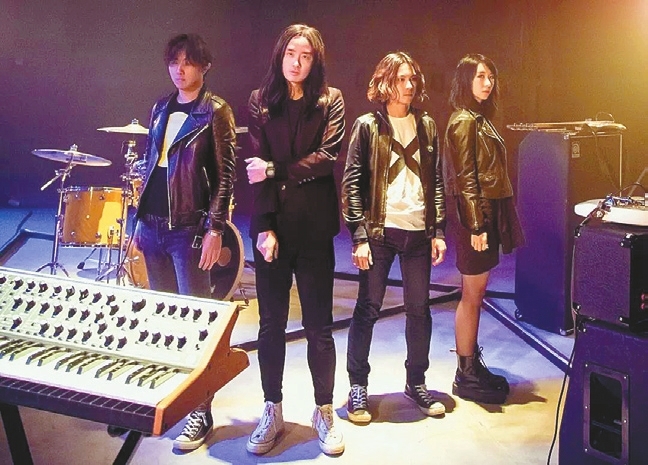

AS the melody of “Do You Want to Dance?” by Chinese pop-rock band New Pants began, Xu Yuan responded with a whirlwind of body movements in his bedroom. Xu was one of about 1.34 million participants who tuned in to a recent online music festival that catered to a vast number of stay-at-home fans amid the coronavirus outbreak. “I have been staying at home for over a month since the onset of the outbreak,” said Xu, a music fan from South China’s Guangdong Province. “I was immediately attracted by the new music festival format.” “An online music festival lacks the passionate atmosphere of an offline event. But I can dance more freely as no one is watching,” he said. The online music festival, called Strawberry_Z, was launched by Chinese label Modern Sky. Over the past decade, it has sponsored 91 Strawberry Music Festivals across China with total attendance exceeding 6 million people. Over the past weeks, nearly all live performances and cultural events in China have been postponed or canceled due to the coronavirus outbreak. For China’s cultural and entertainment industries, going online seemed to be the only way out to mitigate its impact. “Strawberry_Z was launched recently in an effort to salvage the business from the fallout of the outbreak,” said Shen Yue, vice chairman of Modern Sky. The online music festival, which has run two seasons since February, consists of three parts: archive videos of past Strawberry Music Festivals, homemade video programs by musicians and livestreamed performances. It proved popular with audiences. The weeklong second season of the event attracted 15.8 million views. Shen says the online music festival offers comfort and companionship to music fans during the trying times of the outbreak period. “At present, people staying at home have a psychological need for companionship, which can be found in music and offered by musicians,” said Shen. For musicians, the format of an online music festival also provided them with a chance to communicate with fans in an innovative way. Besides music, some shared tips on cooking, daily exercise and even skincare. “Communicating with fans through online instant messaging was a new experience,” said Pang Kuan, keyboardist of New Pants. “I was often overwhelmed by a flood of comments from the fans.” After experiencing the vibe and novelty of the online music festival, many fans hope it will become a fixture even after the virus outbreak subsides. “I hope one day in my bedroom, I can dance with the audiences at world-famous music events such as the Glastonbury and Coachella festivals,” said Xu. For their daily entertainment, young Chinese are also turning to the Internet for a “cloud disco dancing” experience. Some days at 10 p.m., wearing her pajamas, Lu Yiting would turn off the lights at her Beijing home, tune into a livestreaming music remix channel on her iPhone and dance to the disco beats. “Online disco dancing, though not as intense as a nightclub, offers an outlet for emotions and adds some color to my dull, stay-at-home life,” Lu said. On her smartphone screen, participants send their cities and comments, and some send virtual presents to the DJ in order for their virtual avatars linger on the screen for a longer time. “Online disco dancing is more about self-entertaining than socializing with others. Drinking a beer or two and sweating a little bit while dancing really helped to release some pressure,” said Xia Yun, a young man in Yixing, Jiangsu Province. On Feb. 8, the Shanghai-based TAXX Bar launched an unprecedented “cloud disco dancing” session on TikTok, drawing tens of thousands to join. Later, TAXX said peak online participants stood at 71,000 viewers, and the club earned about 367,000 yuan (US$53,000) after deducting commission for TikTok. The livestream became an instant hit and was labeled “cloud disco dancing” on Twitter-like Weibo the next day. Inspired by TAXX, many nightclubs in China have also launched livestreams on various platforms. The ongoing epidemic has affected China’s entertainment industry, forcing shutdowns and leaving facilities idle. Nightclub owners, like so many other business operators, have resorted to online space for salvation. “There is not much to do for many young people after staying home for so long. We’d like to share some fun through livestreaming music and beats and lighten their mood,” said Ruan Liangliang, general manager of TAXX. Club MEI in Changsha, a central Chinese city famous for its nightlife, has also joined the “cloud” since mid-February. “Livestreaming has even attracted those who have rarely or never been to a club,” said Cao Jing, stage performance manager of Club MEI. The club’s TikTok fans have increased by over 500 percent, and the number of its livestreaming viewers also doubled. “We attracted more followers over the past weeks than in the past year,” Cao said. At 8:30 p.m. from Monday to Sunday, Club MEI puts on performances through the livestreaming platforms. The DJ, in addition to remixing music, chats with online participants. Newcomers know more about the nightclub culture and the venue itself and become potential consumers. “Every day I was asked about when the club will open. It’s probably because many people believe our re-opening signifies the end of the epidemic,” he said. Some nightclubs have gone the extra mile to donate what they have received from online broadcasting to fuel the coronavirus fight in Wuhan. TAXX donated all the rewards from the first day’s livestreaming. “Though the company is going through a difficult time, it’s the least we can do as members of society,” Ruan said. Livestreaming is only a temporary measure to fill in the business gap during such a special period, but it has made owners realize the importance of the promotion of nightclub brands among online communities. Cao said they will continue to operate and even expand their livestreaming team after the epidemic to integrate online and offline promotion to maximize their influence. “Relating to the business explosion after the 2003 SARS epidemic — actually many popular nightclub brands emerged during that period — we are confident that the whole nightclub industry will embrace a strong rebound when the coronavirus outbreak is over,” Cao said. (Xinhua) | 
